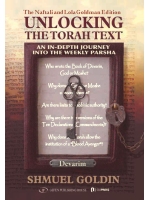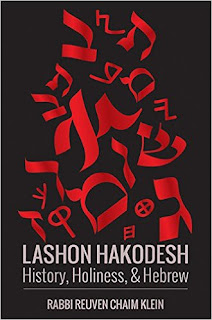Unlocking the Torah Text
Unlocking the Torah
Text (Devarim)
OU Press/ Gefen Publishing 311 Pages
Unlocking the Torah Text is a five volume series on the weekly parsha, and I recently received the “Devarim” volume. Although I don’t know the author, Rabbi Shmuel Goldin, personally, I always admired his leadership of the RCA during his tenure as president, especially how no issue was never too big or too small for him to involve himself with. He comes across as a humble and competent leader with the added benefit of advanced scholarship. I jumped at the opportunity to review his work.
Let me begin by specifically mentioning that Unlocking the Torah Text contains three or four different divrei Torah on every parsha. As one who is in the business of reviewing, critiquing, and advising on the publication of Torah sefarim, I can tell you that this is very significant and important. As I tell all aspiring "parsha book" authors who seek my advice: Always include more than one entry per parsha. This way, if the reader does not enjoy one entry on the parsha, he is sure to enjoy something in the second or third entry. Otherwise, if the reader doesn’t enjoy the only entry for two or three consecutive weeks, he is likely going to move on to the "next" parsha book, and not return to your book any time soon. So right there, this book has that advantage: if the first entry on the parsha doesn’t interest you, the second or third entry surely will.
Every chapter opens with an excerpt or theme from the parsha that the chapter will be dealing with. A number of questions are then asked on the excerpt. What follows, however, is what makes this book unique: The question is then answered in accordance with several, often radically different, approaches. There is emphasis on Gemara and the classical meforshim, but there is also no lack of material from the geonim, rishonin, and achronim. At times the differences of opinion are reconciled, at others times, they are left to “agree to disagree”. The chapters conclude with contemporary examples, personal stories, or an anecdote to help solidify the message, leaving readers with further food for thought.
The author is not shy to bring up “delicate” and “difficult” topics. He readily challenges the Torah's text, and puts the Torah’s characters and episodes in a very real perspective. Some of the highlights of the book include discussions on: who wrote the Torah (Devarim), re-writing history to serve political interests (Devarim), dealing with doubts in one’s faith (Ekev), the legitimacy of eating meat (Re’eh), and rabbinic authority and infallibility (Shoftim), just to name a few. Some entries are halacha related, such as the entries on kriat shema, birkat Hamazon, and hashavat aveida.
Here’s an excerpt from parshat Shoftim (this week!):
Context
The Torah opens a review of the laws governing the
establishment of a Jewish monarchy with the following two verses: When you come
to the land that the Lord your God gives to you, and you possess it and settle
in it, and you will say: “I will set over myself a king, like all the nations
that surround me.” You shall certainly set over yourselves a king whom the Lord
your God shall choose; from among your brethren you shall set over yourselves a
king; you cannot place over yourselves a foreign man, who is not your brother.
The Talmudic scholars view the appointment of a king as an obligation, one of
three positive commandments incumbent on the Israelites upon entry into the
land.
Questions
The wording of this mitzva is abundantly strange. Why does
the Torah base the appointment of a king on the nation’s expressed desire to
“set over myself a king, like all the nations that surround me”? If the
establishment of a monarchy is a positive biblical commandment, why doesn’t the
Torah simply say: When you come to the land, appoint for yourselves a king? Why
would God present a mitzva as developing from the nation’s desire to follow the
mores of surrounding societies?The existence of a direct positive commandment to appoint a
king also seems to fly in the face of the historical narrative surrounding the
selection of Shaul, the first king of Israel. The book of Shmuel clearly
records the extreme displeasure with which the prophet Shmuel greeted the
nation’s request: “Place for us a king, to judge us like all the nations." Even further, when God commands Shmuel to accede to the nation’s request – but
only after informing them of the laws that will govern a future king’s power
over them – the prophet clearly uses the opportunity to dissuade the nation
from their intended path. If the appointment of the king is a mitzva, why is
Shmuel upset with the people’s request and why does he attempt to discourage
them from fulfilling this positive biblical commandment?
Approaches
The earliest recorded attempts to address the apparent disconnect between the biblical mitzva to establish a monarchy and Shmuel’s reaction to the nation’s eventual request are found in the Tosefta, a source from the Mishnaic period. There, three possible approaches are presented. 1. An anonymous position postulates that the nation’s request was premature. The time had not yet arrived for the establishment of the monarchy. Rabbi Nehorai maintains that the mitzva to appoint a king is only recorded in the Torah in anticipation of the nation’s future murmurings. For this reason, the Torah hinges the mitzva upon the nation’s expressed desire to “set over myself a king, like all the nations that surround me.” Finally, Rabbi Eliezer the son of Rabbi Yossi argues that the text in the book of Shmuel actually outlines two separate requests that are made of the prophet, one of which was appropriate and one of which was not. The elders first approached Shmuel with the fitting request “Place for us a king, to judge us.” The people then inappropriately added: “[That we may be also] like all the other nations.” Shmuel was not displeased with the elders’ desire to fulfill the mitzva of establishing a monarchy. His upset developed only in response to the people’s improper addendum.
[this essay continues and the ideas are developed in further depth with the Ohr Hachaim, Kli Yakar, and others]
This is not a "Shabbat table" parsha book. It is an in-depth study on some of the more relevant themes in the weekly parsha. It is advanced but accessible, appropriate for scholars and laymen alike.


